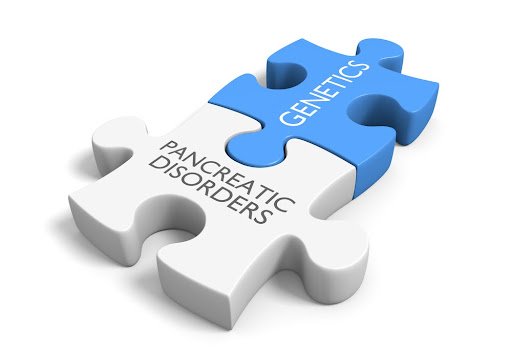Genetics and Pancreatitis
Source: This article was originally published by Mission:Cure here
Pancreatitis patients suffer terrible pain that requires pain management, along with other symptoms, and are often frustrated at the lack of effective treatments. Today, thanks to advances in genomics (the study of genes and their function), we’re on a path toward developing those treatments because we see the clear connection between pancreatitis and genetics. We are expediting these new discoveries and jumpstarting progress toward treatments—and eventually cures—for pancreatitis.
The role of genetics in pancreatitis and hereditary pancreatitis
Traditionally, medicine has overlooked how complex acute pancreatitis and chronic pancreatitis are. This makes it difficult to find and develop therapies. Patients are often wrongly blamed for their own suffering. Medical professionals often focus too much, or solely, on the role of alcohol in pancreatitis, a role we now know has been overstated. This bias results in pancreatitis patients being offered few treatment options and little hope.
Science has played a big role in demystifying pancreatitis. We now see a clear link between pancreatitis and genetics. We understand that multiple factors in different combinations are involved in its cause and progression. Science has made great advances in identifying those factors—especially the genetic factors. More conditions are now being evaluated by genetic testing, more patients are being tested, and more genes are being investigated. These advances are important because they increase our understanding of a long-misunderstood disease.
Today we know that genetic variants (changes in the DNA, also known as mutations) cause or contribute to many cases of pancreatitis. If pancreatitis is caused by the gene of PRSS1, it can be inherited, and is called hereditary pancreatitis. For more information on pancreatitis and genetics, watch our free webinar.
Even in the cases where alcohol does play a role, genetic factors appear to predispose patients to the disease or accelerate the progression of the disease. Science has identified multiple genes and variants involved and understand that some genes cause pancreatitis, while others affect how the disease progresses. Below is a list which highlights some of the genes that researchers have found to cause or contribute to the progression of pancreatitis.
As more people get genetic testing, we increase our knowledge about the specific genetic variants and other factors that cause pancreatitis and the biological mechanisms that underlie the disease. This means that we will soon be able to predict individual patients’ disease progression and outcomes. We will be able to better tailor treatments to each patient’s needs, linking the right treatment(s) to the right people. In the long term, we will finally be able to move beyond treating symptoms and intervene earlier to slow or prevent the progression of pancreatitis.
Genetic testing for acute pancreatitis and chronic pancreatitis
If you’re a pancreatitis patient, you may have questions about genetic testing.
Which patients should consider genetic testing?
Current guidelines suggest testing for certain subgroups of pancreatic patients, such as unexplained recurrent acute or chronic pancreatitis, a family history of pancreatitis, or an early onset of pancreatitis. Genetic testing can be useful in any case in which the cause is unclear, even if there is a history of excessive alcohol consumption. We also know that genetic causes of pancreatitis are common in children.
The question of insurance coverage is also raised. Coverage depends on the plan. But, recognizing the importance of this information, insurance companies are increasingly covering testing. If you have specific questions about coverage, talk with the genetic testing company or your insurance provider. In many cases, the testing company has resources to help navigate this process.
What kind of testing should I get?
There is a wide variation in the pancreatitis testing panels offered by different companies. It is crucial to talk to your provider about your specific situation. Your doctor, and sometimes a genetic counselor, can help decide what to test and what company to use. They can explain the risks and benefits of testing and what types of results may be returned. Understanding all of this before testing is important. You can find more information about genetic counselors and find a genetic counselor here.
What will testing tell me? How will it help?
Genetic testing will identify if you have any changes in your genes that might cause pancreatitis or result in faster disease progression, giving you and your practitioner vital information: the type of disease you have, whether you have disease-modifying genes, and how your disease might progress without treatment. This information can also help determine whether any of your family members may also be at risk. Genetic testing may also help identify other tests that may be recommended such as screening for diabetes, cystic fibrosis or pancreatic cancer. In the near future, we also hope that genetic testing will help identify what medications might help you based on what genetic variant you have, similar to what happens in cystic fibrosis. For more information about how genes affect the medication you take, watch our free webinar.
This text was written in collaboration with Dr. Mark Haupt. Dr. Mark Haupt, MD is the Chief Medical Officer of Ariel Precision Medicine, a company that provides digital health and genomics solutions for complex disorders, like pancreatitis.
Mark Haupt, MD is a Pediatric Pulmonologist who has dedicated his career to helping patients with pancreatic disease through his work in academia, the pharmaceutical industry, and his current work with Ariel.




